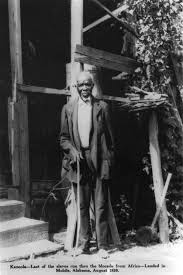
It’s funny to think that of all the millions and millions of people who were abducted out of Africa to be enslaved in America, and all the reams of print about that experience, we retain the actual personal stories of just a handful of the people who actually lived it – perhaps ten. This is one of those stories.
Kossola was the last person alive to actually recall a life in Africa and his abduction from there, and luckily Hurston got to him in time to write down his remarkable life. He was willing to co-operate, because, as he said:
I want tellee somebody who I is, so maybe day go in de Afficky soil some day and callee my name and somebody say, ‘Yeah, I know Kossola.’
Then, because the world sucks, she couldn’t find a publisher in her lifetime. Luckily though, it’s published now, and it’s an instructive and extraordinarily sad life story. Kossola (called Cudjo in America) was born in what is today Nigeria. Unfortunately for him, his village was near the kingdom of Dahomey, which kingdom had entirely stopped all farming and focused solely on selling their neighbours. A fearsome force, they had 12,000 soldiers (including women) and when they attacked Kossola’s village they slaughtered the old indiscriminately and enslaved the young. They brought the heads of the dead with them on the march back to Dahomey, and the only break on the march was when they stopped to smoke them, the smell getting to be too much.
Rather charmingly, Hurston is surprised that black people would sell other black people. I guess it speaks to a 1930s era world view and set of politics. To me it seems very strange, because of course black people are like people everywhere: willing to do what it takes to turn a profit.
Kossola is then sold to a white man who appears to have been attempting to win a bet – that he could bring slaves into America despite this being banned. He succeeds, but it’s a brief victory, for slavery is abolished five years later. Poor Kossola! It’s like being killed in the last week of the First World War.
Kossola and those who came over with him immediately plan to return to Africa, but quickly realize they will never raise the money to do so. Thus they plan to form their own little community, Africatown, made up of Africans, because the American born black people are not very welcoming:
So we dance lak in de Afficky soil. De American colored folks, you unnerstand me, dey say we savage and den dey laugh at us and doan come say nothin’ to us
They need land to create their town, so they think to ask their slaver for it, on the very good basis that he owes them. Just try this:
Cap’n Tim Meaher come sit on de tree Cudjo just choppee down. I say, now is de time for Cudjo to speakee for his people. We want lan’ so much I almost cry and derefo’ I stoppee work and lookee and lookee at Cap’n Tim. He set on de tree choppin splinters wid his pocket knife. When he doan hear de axe on de tree no mo’ he look up and seeCudjo standin’ dere. Derefo’ he astee me, ‘Cudjo, what make you so sad?’“I tell him, ‘Cap’n Tim, I grieve for my home.’“
It goes on; of course he says no. Eventually they raise the money to buy the land from him, and he insists on full price. I find this a totally surreal scene: there he is with his penknife while you ask him for a little something in exchange for destroying your life. The book is full of this kind of telling detail: the last time Kossola sees his son (before his head his cut off by a train); the sugar cane he is growing for his twin grandchildren. Hurston is a remarkable writer, and perhaps some of this is her; but the Introduction suggests that much of what he says is also verified by external documents (e.g., the raid by the Dahomians). She tells his story in his own voice by describing her conversations with him, and even these interconnecting parts – about how she sits on his porch – are lovely. Here they are in a break:
At the end he asks her to take some pictures of him. One in the graveyard with his family (as they all pre-deceased him) and the other as above. Apparently he wanted to be shown without his shoes on, as if he was in “Affiky” because, as he explained, that’s where he wanted to be.
I full on ugly cried while waiting for my friends outside a Chinese restaurant.

I am putting this on the list. (And I finally found your blog!)
You should – it's really amazing 🙂